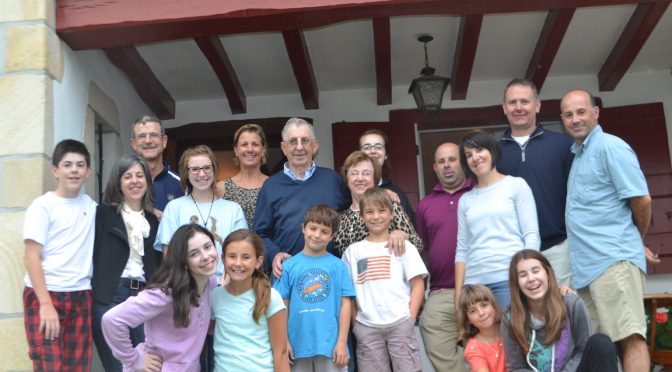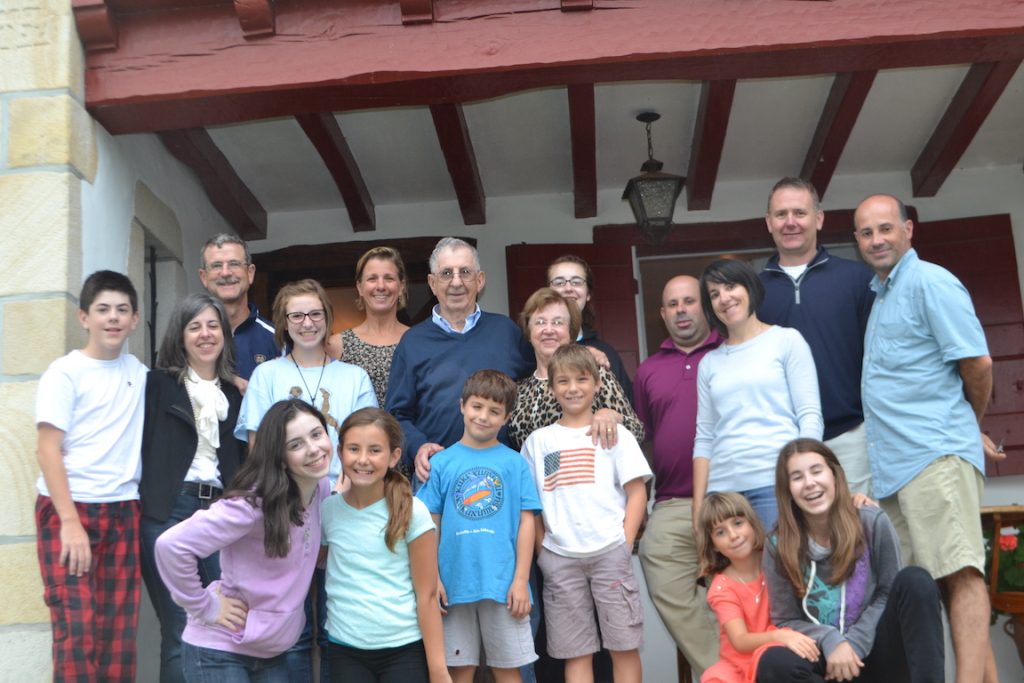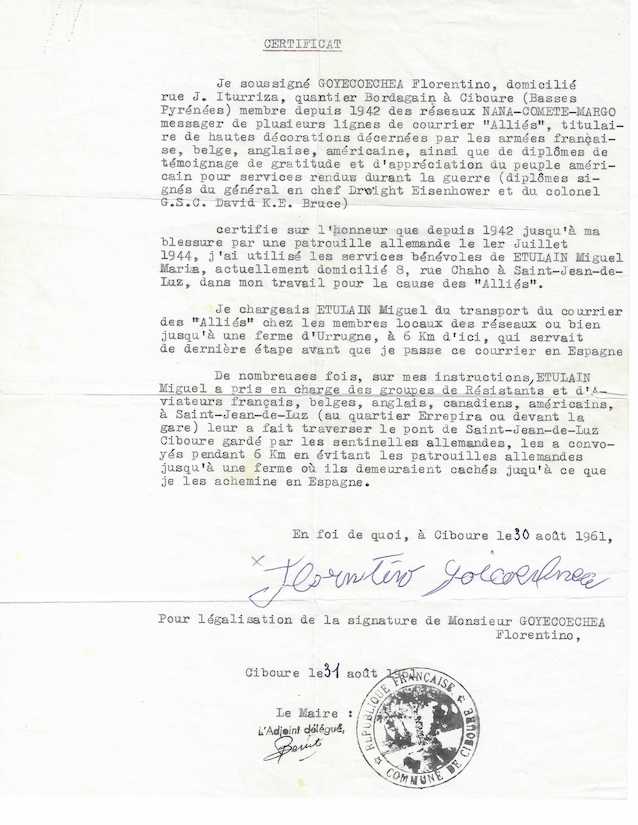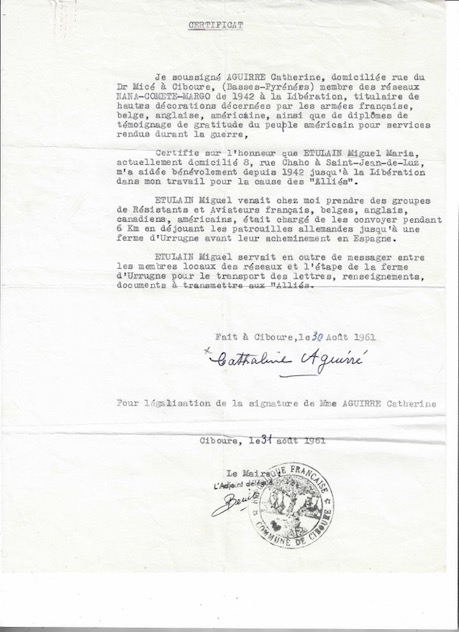By John Etulain
Like many other Basques before and after him, my father, Miguel “Mike” Etulain, came to the United States and made a notable life for himself and his family. In 1952, he arrived in the United States where he worked for his Uncle Juan Etulain in Sunnyside, Washington. Juan was getting out of the sheep industry at the time, so Miguel eventually moved to the Columbia Basin where his Uncle Sebastian Etulain introduced him to Cal Courtright who worked in the cattle industry. Miguel worked for Cal for the next 30 years managing the cattle feedlot. In 1962, he went back to the Basque Country where he married Prudencia Iriarte from Amaiur and brought her to Warden, a small town in eastern Washington. There they raised four children on the family farm.
His life in America was similar to many other Basques, but my dad had a different childhood which in many ways, shaped his life. He was born 1930 in the town of Bera de Bidasoa, and lived in Hondarribia with his mother, Juanita, and two sisters, Asuncion and Carmen. In September of 1936, during the Spanish Civil War, Juanita took the family (and her sewing machine) and crossed over in a small boat from Irun to Hendaye. They initially stayed with a friend in Hendaye then moved to Ciboure where my grandmother worked as a seamstress or any job she could find. The family was taken in by two very kind sisters, Sabine Frisou Urrusmendi and Mayi Frisou Despax. My aunt tells the story that when asked how much it would cost to rent a room, Mayi told Juanita to take care of the children first and they could figure rent out later. The three of them lived in the single room for many years and were considered family.
A lady by the name of Pantxika Irastorza would deliver milk to Ciboure and took a liking to my father. She asked him if he wanted to visit her farm and he said yes and soon would go to the farm whenever he could to work and help out. My dad was very resourceful and clever. He was given an old bicycle that he used to go back and forth to the farm, but had to be creative and use any old parts he could find to keep the bike going.
The name of the farm was Tomaxenia and this is where another interesting part of my dad’s childhood began. The farm was used by the network of local import/export men, also known as smugglers, and this how my dad got to know Florentino Goikoetxea. During World War II, Florentino was one of the main individuals involved in the Comet Line. The Comet Line was a resistance organization that guided Allied soldiers and downed pilots in occupied France and Belgium and smuggled them over the mountains to the British consulate in Bilbao where they would be transported back to Britain and the US. Florentino worked on one of the farms and at night he guided many of the pilots over the mountains, across the Bidasoa river, and on to Bilbao. He asked my dad if he would be willing to be a courier and my dad agreed but told no one. My dad told me how he would carry documents from the Hotel Euskaldunak (located across from the train station in St. Jean de Luz) to the farm in Urrugne. He would make the 6-kilometer trip either by foot or by bike. At times he not only carried documents, but also guided some of the downed pilots from St. Jean de Luz to the farm. He would take off by foot or bike and the men would follow at a distance. I am unsure how many trips he made, but the amazing part of the story is that my father would have been between 12 and 14 years old at the time, making him one of the youngest helpers of the Comet Line.
In 1952, my dad came to the US to build his life but did not speak much of what he did during the War. In the late 70’s we had family from the Basque Country visiting us in Warden and a local paper had come out to run a story on the visitors from a foreign land. My father mentioned some details about helping the Comet Line to the reporter and the reporter returned to write another story about Dad. The story was picked up by the AP and soon he was receiving letters and clippings people had sent from other newspapers. I was looking through some of dad’s papers and came across a folder containing some of these articles. It also contained an article about the Comet line he had taken from Readers Digest and a photo of Kattaline Aguirre. But the most important were three signed letters of accommodations he had received from Kattaline Aguirre (who worked at the Hotel Euskaldunak), Martin Hurtado and from Florentino Goikoetxea documenting his service.
On trips back to the Basque Country, my dad did take me along the route and visited the farm. I have since read up on the Comet line and have put together some of the pieces that he told me and items I read myself. Dad would tell stories growing up during that time, the sacrifices that his mother made for the family, friends that he had, and the kindness of others. He has been gone now for over three years but his example and the life lessons that he taught us are still with us today.
Discover more from Buber's Basque Page
Subscribe to get the latest posts sent to your email.







Ezkerrik asko, historia eder bat
Thank you John Etulain for sharing your Dad’s history. Your letter brought back many memories.
There was a prof. at the University of New Mexico with the name Etulain. I forgot his first name. He may have been an Archaeologist–he would go the Basque country almost every Summer to do research. It was a while back–I retired from UNM about 20 years ago. Do you think that you may be related?
We, from the Pyrenees, on both sides of the border have survived Franco, ETA, WWII and beyond. We have created a bond that will never be broken. Nunca et jamais.
Thank you for posting this letter.
Monique
Hi. Thanks for your comments. Yes that is Dad’s cousin Richard Etulain who was a professor at UNM. He focused on American West history but did some books on Basques in America as well.
Greetings Daniel,
Thank you. Yes, I remember Richar Etulain at UNM but it was not the person I referred to. Maybe another relative –but there was a connection with UNM– to what degree I do not know or remember.
Monique
Monique, you are referring to me. I taught history at UNM from 1979 to 2001. You might be interested in my new book: BOYHOOD AMONG THE WOOLIES: GROWING UP ON A BASQUE SHEEP RANCH. Washington State University Press will publish it this next week. Dick Etulain
Hi Dick! I wouldn’t expect you might remember me, but we met back in 1999, when I did an intern at Sandia. I think you did a book signing somewhere in Albuquerque. Anyways, nice to hear from you.
Good to hear from you. Yep, I did some book signings in Albuquerque before I retired early from UNM in 2001. Recently, I did a couple of books on Billy the Kid. I’ve done three books on the Basques and am now working on another, which includes the first essay anyone has done on the Basques of Washington. I’ll be asking you some questions about the Basque Club in Seattle, if that is OK
with you. Dick Etulain
Hi Dick, of course, I’d be happy to answer any questions. I look forward to seeing your essay and will be looking for your books!
I am writing an essay on the Basques of Washington and want to include a few paragraphs on the Seattle Basque Club. I haven’t been able to get responses from my cousin John Etulain and his wife Toni, but since I see where you were once a leader of the club, I am hoping you might be able to help with the history of the club. Know of any historical write-up on the club? At this point, any historical information would be very helpful. Do you have Basque club in New Mexico?
Dick Etulain
Hello Dr. Etulain! Yes, I remember you at UNM!! and thank you for giving me the title of your book. Pure serendipity!!
The Etulain I spoke with over 30 years ago was not you.
I worked at UNM from 1979 to 2001. First at Gov. Publications, to the Fine Arts Library and later at the Center for Southwest Research.
John’s post brought back good and not so good memories. I have seen few rodeos in my life, including at UNM!! Be well, be safe and enjoy the good food and wines of Oregon.
Monique
Monique, if you worked in the area now called the Center for the Southwest in the Zimmerman Library before I left UNM in 2001, I would have been in that collection dozens of times. Nancy Brown Martinez was my secretary-assistant at the NM HISTORICAL REVIEW before she went to the SW Center, which I had encouraged her to do. Dick Etulain
Mike was such a special person in so many ways It’s always been an honor to know him, let alone to be a part of his extended family. Thanks for sharing
Awesome family! Great story. Thanks for sharing
I enjoyed Mr. Etulain’s story immensely. I have visited towns in Pays Basque, Navarra and Southern France. His story reminded me of a WW II veteran I met and interviewed in Lourdes in 1997. I didn’t ask his name when we met in a park and he spoke with me. He was from Spain and had fought in the Republican Army against Franco’s troops. He fled to France with fellow soldiers to avoid death. Arrested by the French, he and his buddies broke out and headed to the Mediterranean coast, were re-arrested, forced into the Vichy army to avoid deportation, fought against the British in North Africa, surrendered. Charles De Gaulle (he said “…a very tall French general.”)entered the POW camp and offered pardons to those who would join the Free French to train in England. He said, “but we’re Spanish”. De Gaulle promised them French passports after the liberation. He was wounded by German machine gun in Belgium. He was limping and showed me the scarred knee. “I was fortunate to wind up in an American field hospital. The French might have amputated. Now I live in the veteran’s home and visit family in Spain. My brother-in-law was a ‘falangista’, but I show him my passport and smile.”
Carlos Valle, PhD
Professor of Urban Studies, History and Radiologic Science (Retired)
Laredo, Texas
Great story Carlos! Thank you for sharing!
This story was interesting, informative and beautifully written John. I was quite young when your father, my cousin, came to live with us in Sunnyside Washington. I remember the many months of eager anticipation about when our exotic cousin would land in the US. My sister, Bonnie, and I adored our handsome cousin, Miguel. We both have many fond memories of the years he lived with us. I know he made my father, Juan Etulain, very proud.
Mike took me on my first deer hunting trip in northern Washington State. I worked with him at my Uncle’s feedlot in Warden for three years. Wonderful man and family. Eric Eiland.